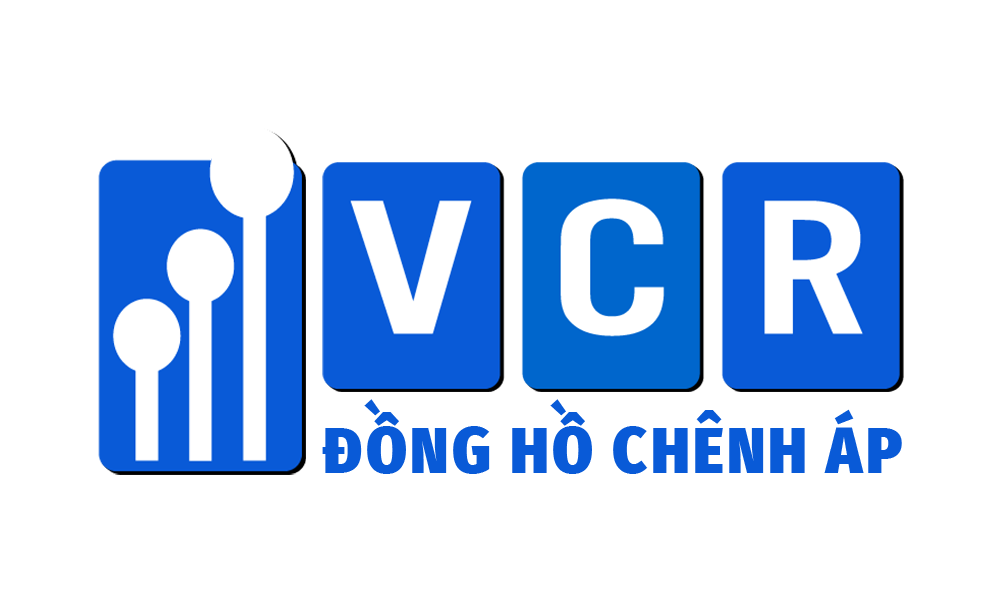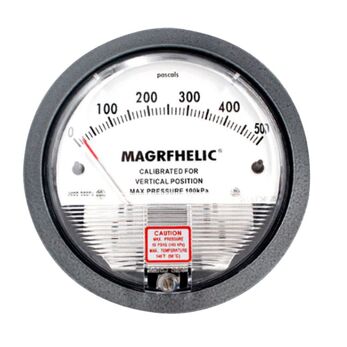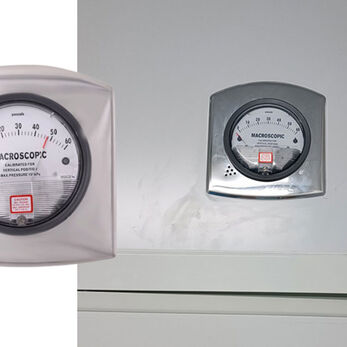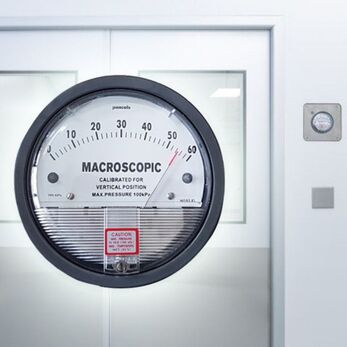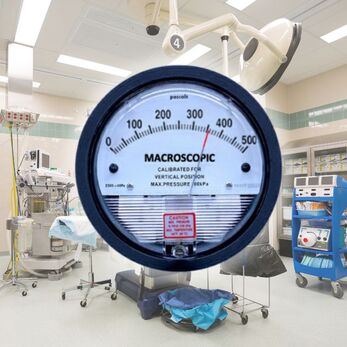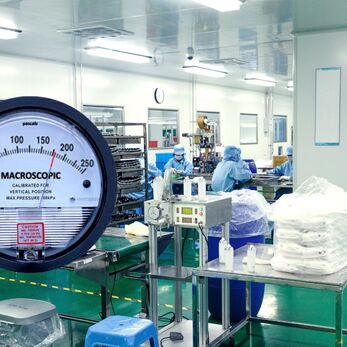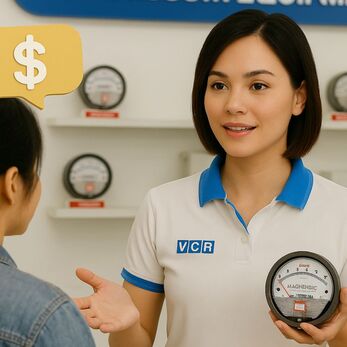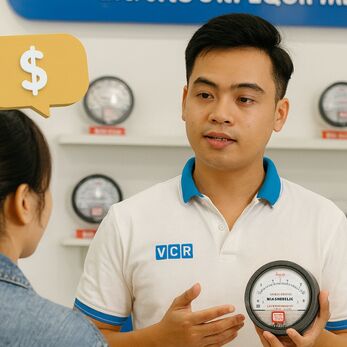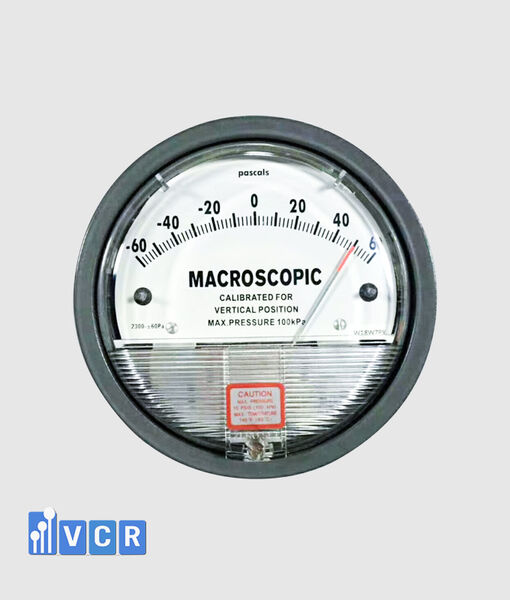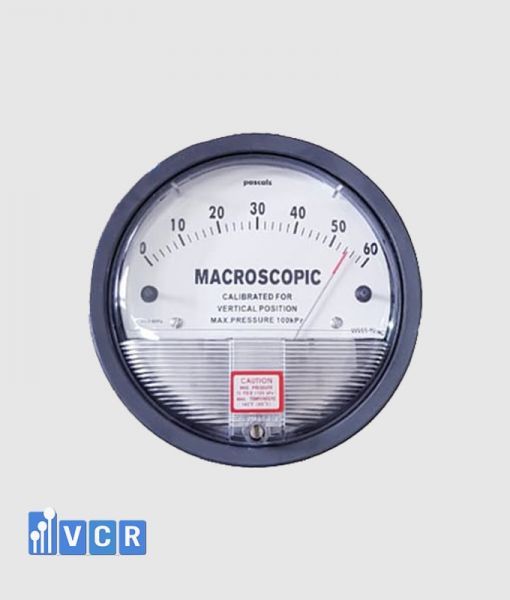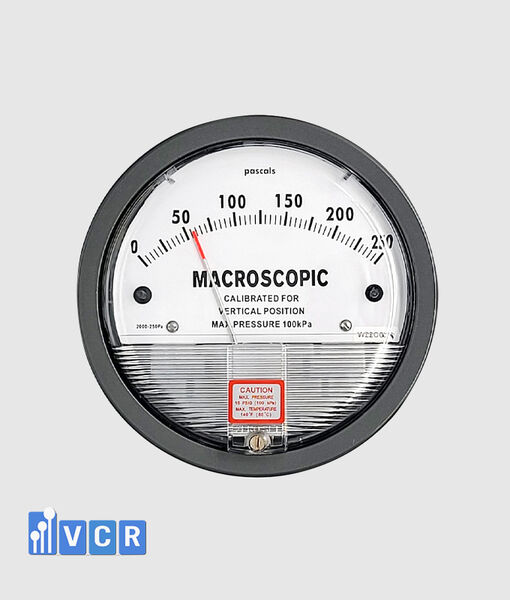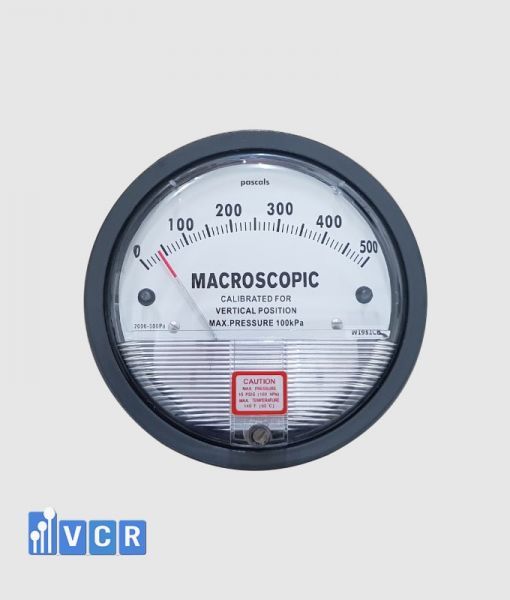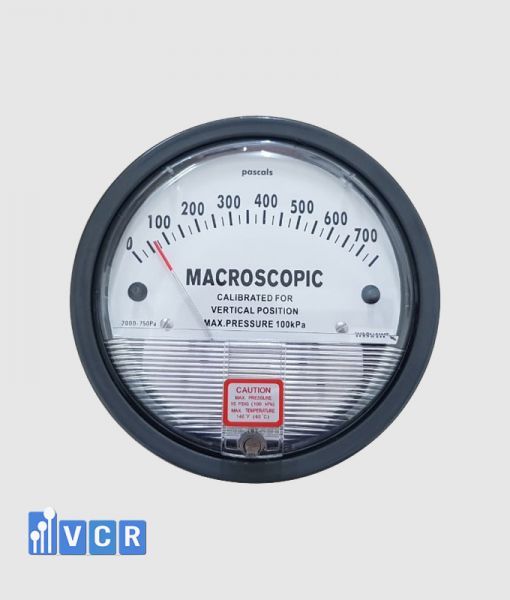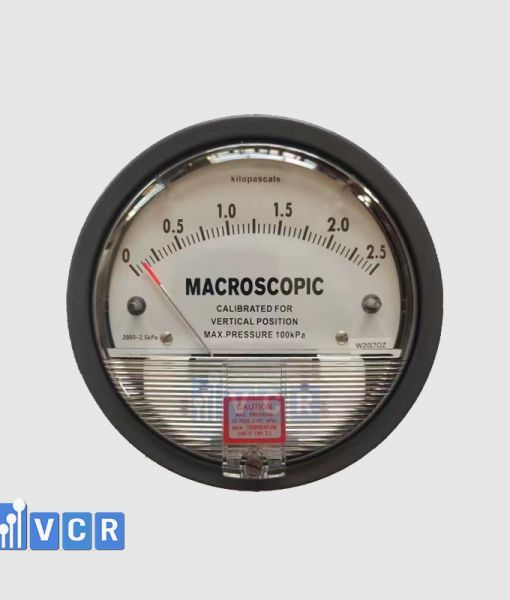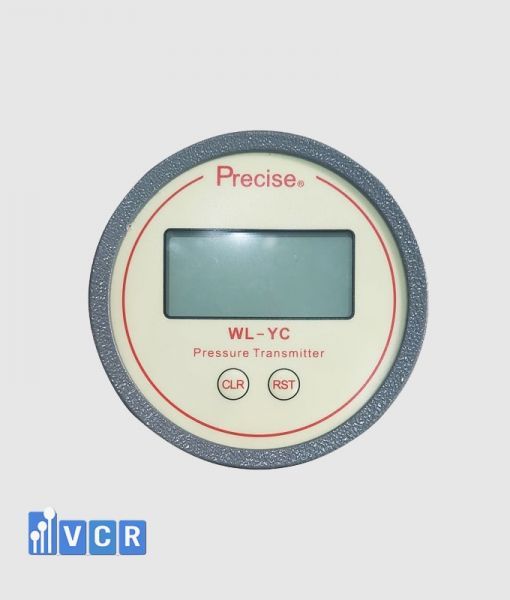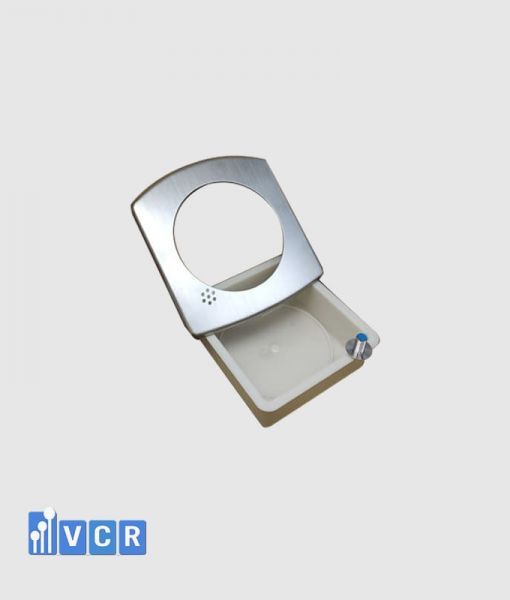Differential pressure gauges are indispensable in cosmetic weighing rooms — where a stable air environment and strict control are required. By monitoring real-time pressure differentials, the device helps maintain the correct airflow direction, prevent cross-contamination and ensure GMP standards are met.
- 1. Overview of differential pressure gauges in cosmetic weighing rooms
- 2. Why you need to install a differential pressure gauge in a cosmetic weighing room
- 3. Common types of differential pressure gauges today
- 4. Criteria for choosing a reputable supplier of differential pressure gauges
- 5. Introducing VCR - Specialist supplier of cleanroom control equipment for the cosmetics industry
- 6. Frequently Asked Questions (FAQ)
1. Overview of differential pressure gauges in cosmetic weighing rooms
The weighing room is a key area in the cosmetics production process, where raw materials are weighed and prepared. Accuracy in operations and a strictly controlled air environment are two factors decisive for product quality and production safety.
In practice, the weighing area is often a site with a high risk of cross-contamination, particularly when handling powdery active ingredients or strong-smelling chemicals. To limit fine dust spreading to surrounding areas, cosmetics factories often design a pressure differential system between the weighing room and adjacent spaces. The goal is to keep air always moving in a controlled direction, preventing contaminants from spreading back into cleaner zones.
This is exactly where differential pressure gauges come into play. A differential pressure gauge measures the pressure difference between two spaces, for example between the weighing room and the air-lock corridor. By showing the pressure value in real time, operators can easily monitor and promptly detect if the pressure differential falls outside the permitted range (too low or reversed). This contributes to ensuring compliance with GMP standards and maintaining the cleanroom environment quality.
Depending on technical requirements and plant scale, the differential pressure gauge can be an analog dial type, digital, or a sensor integrated into a central monitoring system. Regardless of the type chosen, their core role remains supporting effective airflow control and preventing cross-contamination - a critically important requirement in the modern cosmetics industry.

Read more: Latest price list of Differential pressure gauge used in Cosmetic factory
2. Why you need to install a differential pressure gauge in a cosmetic weighing room
In a cosmetics production environment that meets GMP or ISO 22716 standards, air quality control is not just a recommendation but a mandatory requirement. One of the key criteria is maintaining a pressure differential between functional areas in order to ensure airflow direction and prevent cross-contamination.
The weighing room - handling raw materials such as powders, potent actives, or essential oils - is often set up at either positive or negative pressure depending on contamination control needs. For example, to protect the product from impurities, the weighing room may be maintained at higher pressure than the adjacent air-lock. Conversely, if dust or vapours from the weighing room must not spread outward, a negative pressure may be established relative to neighbouring clean zones.
Maintaining a stable pressure differential is not simple, especially in cosmetics factories with frequent door openings and high personnel traffic. This is where a differential pressure gauge plays a continuous monitoring role, helping to:
-
Provide timely warning if the pressure exceeds the allowable threshold, avoiding airflow reversal.
-
Optimise HVAC operation, ensuring the air-filtration system works as designed.
-
Support periodic inspections and evaluations, serving the audit process under GMP/ISO standards.
Especially when using digital gauges or sensors connected to a BMS (Building Management System), the management team can monitor data remotely and store logs for traceability - highly necessary during GMP audits by authorities.
In short, installing a differential pressure gauge in the weighing room not only ensures operational accuracy but also enhances compliance capability, thereby increasing a cosmetics factory's competitiveness in the market.

Read more: Selecting the Perfect Differential Pressure Gauge for Your Cleanroom
3. Common types of differential pressure gauges today
Depending on usage needs, plant scale and level of control required, differential pressure gauges are typically divided into three main categories: mechanical dial (analog), digital gauges and electronic differential pressure sensors. Each type has its own operating principle and application in different cosmetics production environments.
| Type | Operating principle | Advantages | Common application |
|---|---|---|---|
| Mechanical dial (analog) | Bourdon tube or flexible diaphragm | Simple structure, no power required, low cost | Small-scale weighing rooms where remote monitoring isn’t needed |
| Digital gauge | Electronic pressure sensor with digital display | Precise display, easy to read, has alarm function | Large factories’ weighing rooms requiring high accuracy |
| Electronic differential pressure sensor | Outputs 4-20 mA current signal | Connects to central monitoring system (BMS/SCADA) | GMP-compliant weighing rooms requiring real-time logging and control |
In the cosmetics industry, choosing the appropriate gauge type depends not only on budget but also on GMP audit requirements, HVAC/BMS integration capability, and the level of contamination control in each area.
Read more: Differential Pressure Gauge Costs: A Guide for Vietnamese Cleanrooms
4. Criteria for choosing a reputable supplier of differential pressure gauges
Selecting the right supplier of differential pressure gauges not only ensures the quality of the device but also directly affects the operational effectiveness of your cleanroom - especially in GMP-compliant cosmetics factories. Below are the key criteria businesses should consider:
Practical experience in the cosmetics industry
Not every vendor understands the specifics of cleanrooms in cosmetics - where differential pressure must be stable yet the staff must still work flexible. Prioritise suppliers who have implemented projects in GMP, ISO 22716-certified facilities or have customer credentials in functional cosmetics, skincare or hair-care production.
Tailored solution consultation for each area
A reputable supplier doesn’t just sell devices - they propose a total solution: from selecting the appropriate gauge type for the raw-material weighing room (negative pressure), to the filling room (positive pressure), to the installation position and usage instructions. Customising the solution for each area helps optimise control effectiveness while saving cost.
Full-service offering: installation, calibration, maintenance
A differential pressure gauge is a sensitive measurement device and must be properly installed and regularly calibrated to maintain accuracy. Therefore, favour suppliers with a professional technical team offering on-site maintenance and calibration services - avoiding production downtime when devices fail.
Availability of devices and spare parts
Long wait times for replacement equipment can disrupt cleanroom operations. A good supplier should ensure stock readiness and rapid repair or replacement when needed.
Provision of full documentation: CO, CQ, calibration certificates
During GMP or ISO audits, transparency of device origin is required. Thus, it’s essential to choose a supplier who provides Certificates of Origin (CO), Certificates of Quality (CQ), and calibration certificates for each differential pressure gauge installed.

Read more: Workings of Differential Pressure Gauges: A Guide to Function, Calibration, and Maintenance
5. Introducing VCR - Specialist supplier of cleanroom control equipment for the cosmetics industry
If you are looking for a trustworthy partner to supply and implement differential pressure gauges for cosmetic weighing rooms, VCR is your top choice.
With over 10 years’ experience in the GMP cleanroom sector, VCR specialises in supplying devices and solutions for GMP-compliant cleanrooms in cosmetics, pharmaceuticals and functional foods. Having implemented projects in hundreds of factories nationwide, VCR fully understands the strict technical requirements and auditing standards of the cosmetics manufacturing industry.
Comprehensive product range - specialised for weighing rooms
VCR offers a full range of devices serving pressure control in cleanrooms, including:
-
Analog differential pressure gauges: suitable for simple weighing rooms, cost-optimised.
-
Electronic differential pressure sensors: connectable to BMS, for central monitoring.
-
Pressure displays, deviation alarm units, flexible integration by area.
All devices are from clearly-traceable origins, fully calibrated and ready to support GMP inspections.
Technical team specialising in cosmetics industry
VCR goes beyond selling devices - it partners with customers from design through operation. VCR’s engineers have worked with major cosmetics brands, helping to provide optimal solutions for each type of weighing room: from raw materials, to filling, to packaging.
Support for inspection and pressure-design consultation from the start
Unlike vendors who only supply devices individually, VCR conducts site surveys of the weighing room, checks real-world conditions and proposes suitable pressure-differential design. This helps the customer save initial investment cost and minimise the risk of non-compliance at start-up.

Read more: Supplier of Differential Pressure Gauges for GMP Clean Rooms
6. Frequently Asked Questions (FAQ)
What differential pressure should a cosmetics weighing room maintain to be compliant?
Depending on HVAC design and cleanroom class, but typically a weighing room should maintain a differential pressure of 10-15 Pascal compared to a less-clean area. This ensures airflow always moves the correct way, limits cross‐contamination risk and meets GMP standards.
Is periodic calibration required for the differential pressure gauge?
Yes. Since the gauge is a measurement device, periodic calibration every 6-12 months is mandatory. Calibration ensures measurement accuracy, prevents deviation that could affect the cleanroom environment and product quality assessment.
Can the differential pressure gauge be connected to the plant’s BMS system?
Yes. Many modern differential pressure sensors are designed with 4-20 mA or Modbus outputs, making integration into BMS/SCADA systems easy. This allows the plant to monitor and log pressure data in real time.
Does VCR provide installation and calibration services for the gauge?
Yes. VCR offers on-site installation, calibration services under cleanroom standards, and full calibration certificates. VCR’s technical team ensures the device operates within specification and is ready to support customers before GMP audits.
Looking for a GMP-compliant differential pressure gauge solution for your cosmetics weighing room?
Do you need a device that measures accurately, is easy to monitor, fully calibrated and installed correctly?
Let VCR accompany you from design through to operation.
We commit to supplying quality devices, advising correctly on objectives and providing full technical support for each cleanroom project in the cosmetics industry.
Contact:
Hotline: 090.123.9008
Email: [email protected]
Website: https://donghochenhap.com/
Dat VCR


